What’s Actually Selling in the “New Economy.” Plus, Launching in a Recession.
The latest episode of the Oberlo podcast explains how to find products that will sell in the “new economy,” and then takes a first-hand look at what it’s like to launch a business in the middle of a recession.
First up is Jessica, host of the online course Oberlo 101, who has been chatting with ecommerce entrepreneurs and digging into Oberlo data to see what’s selling in this “new economy.” She dishes out some awesome insights into emerging niches, talks about products to avoid, and gives tips on how to make sure your ad copy hits the marks in these weird times.
If you’re short on time, here’s a TL;DR version of what’s selling:
- Women’s clothing
- Mobile phone accessories
- Home office items
- Jewelry
- Home storage products
- Selected kitchen products
- Plants and gardening products
- Home exercise equipment
Next up, we talk with Gina Locklear, founder of the beautiful sock store at zkano.com. We got Gina on the line to explain what it was like to launch Zkano in 2009, just after the financial crisis and Great Recession kicked off, and right in the middle of month after month after month of horrible, horrible economic news. Here we are, 10+ years later, and zkano.com is still home to some of the coolest socks that you will ever see. Gina explains what new entrepreneurs should be ready for if they’re launching now – in the midst of what appears to be a pretty dicey economic situation.
Here’s a short five-point summary of the main takeaways:
- With a background in real estate, Gina had neither ecommerce nor fashion experience when she launched Zkano right after the 2008 financial crisis.
- Unable to hire a marketing agency, she had to learn everything from scratch. That includes getting trademarks, packaging, marketing, selling online, etc.
- Businesses that offer services that make it easier for people to live their lives now in these strange times could be successful.
- Amid the current uncertainty, there’s a silver lining in that people do want to support small businesses right now and they’re shopping online.
- If you’re thinking about launching an online business right now, persevere, don’t give up, and be stubborn.
Start Yours is a podcast about ecommerce, dropshipping, and all things launching a business.
Join us as we meet entrepreneurs who have gone through the triumphs and headaches of running an online store, and learn how they managed to survive and thrive.

Don’t wait for someone else to do it. Hire yourself and start calling the shots.
Get Started FreePart 1: “What’s Selling” With Jessica
David: Before we dig into the product ideas and the different business ideas that you’ve done a lot of research on, I wanna step back real quick and just explain what you were looking at when you dug into these products.
And so basically it seems like your hypothesis was, “Lots of things are changing right now, with Coronavirus and new concerns and new ways of working and new ways of living.” And so you kind of asked, “What are the products that are gonna be selling best, not just today, but moving forward?”
And so what were the basic criteria that you were looking for as you dug into this topic, and as you dug into these different products?
Jessica: So first and foremost, we were looking for products that were ethical to sell because there are dropshippers right now who are trying to make money by selling products based on fear. There are also a lot of merchants who are making money selling products that people need for their health.
So I’m not putting this down as a blanket category. But there’s a lot of room for entrepreneurs to be making money selling products that aren’t based on fear, that aren’t overcharging for toilet paper, or face masks. And not only is there an opportunity there, but I think as this economy changes and adapts to the global pandemic, there’s room for entrepreneurs to play a role that’s more than just people making a buck, and that comes through in a lot of the products here.
You’re a problem solver as an entrepreneur. You’re giving someone a tool to solve a problem, to bring joy into their life and that’s a powerful thing.
And we don’t usually think of entrepreneurs who are dropshippers that way. We kind of think of ourselves as really hustling entrepreneurs, but we have that role to play when we act ethically, and really creatively in this new economy.
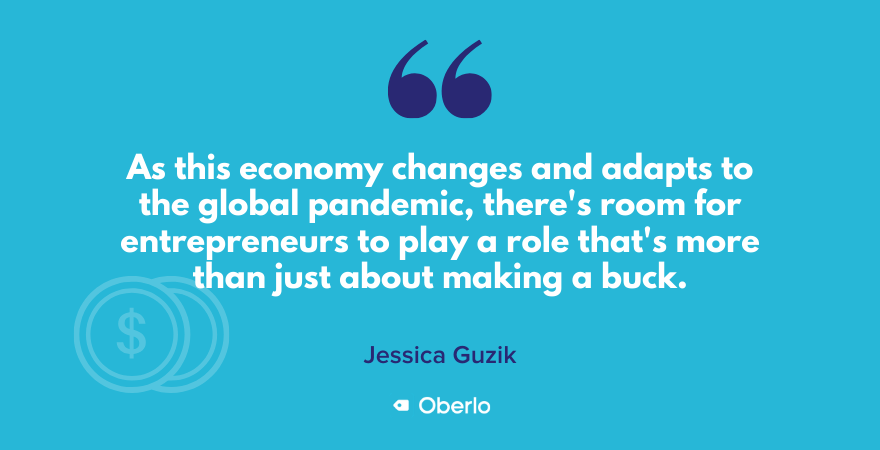
David: Cool, so you talk about the new economy. And one of the things that seem to be a hallmark of this new economy is that we’re spending a lot of time at home and so let’s start by looking at the home and this idea of staying comfortable when you’re stuck at home. And that would bring us to different clothes you can wear.
And so, hoodies and sweatshirts were something that you talked about. What jumped out at you when it came to hoodies and different lounge-wear like that as being viable in this new economy that you’re talking about?
Jessica: So I… Yeah, hoodies, sweatshirts, socks, PJs… These are kind of all falling into the same category of comfort lounge-wear for home. The reason that I point them out is that people are going to be looking to be comfortable at home. There’s not the same reason to get dressed up so that you feel confident as you’re walking through the metro station that there was two months ago.
And instead, as you’re trying to make yourself comfortable in this new home office environment, if you’re trying to just comfort yourself in a difficult time, you’re reaching for the comfy clothes.
Hoodies to me are like blankets you can wear, like blankets with a hood. So I always wear mine when I’m seeking comfort. There’s nothing that can beat that soft new hoodie feeling and so I think that’s where entrepreneurs can get creative.
Another thing that I love about all of these categories, hoodies, socks, underwear… Or not quite underwear but like lounge-wear and pajamas is that it’s not so size sensitive. We had a YouTube commenter ask us, “Well, what do I do about size charts?”
You wanna include some size charts. But this isn’t jeans, people aren’t looking for the perfect fit. All of these clothing items should fit loosely, and that is a forgiving aspect of these products that makes them a good candidate to sell.
David: And while on the topic of socks, let me plug the second half of this podcast where we’re gonna talk with a woman named Gina Locklear and she actually launched a sock store called Zkano in 2009, which is right in the middle of the Great Recession, so we’re gonna get into some really interesting stuff about how to weather a horrible economy.
Of course, those weird circumstances were different than the ones that we’re dealing with now. But she has some really good insights into things that entrepreneurs should be doing when people are pinching pennies and when things are just kind of uncertain. So just ’cause you mentioned socks I gotta plug what we’re up to later.
Jessica: Ooh. I wish I could listen to that, I can’t wait.
1. Women’s Clothing
David: You can if you download this episode of the podcast. So we touched on clothing, and I wanted to dig a little deeper into women’s clothing. This has always been a huge category for Oberlo users.
I was doing some research beforehand. It was the number two category for Oberlo users in terms of total revenue last year, and then number three in terms of total orders. So this is a category that people have a lot of success with. There’s a lot of demand for it. And so I’m curious if there’s anything in particular that people should be looking out for within this category that we know is already pretty strong.
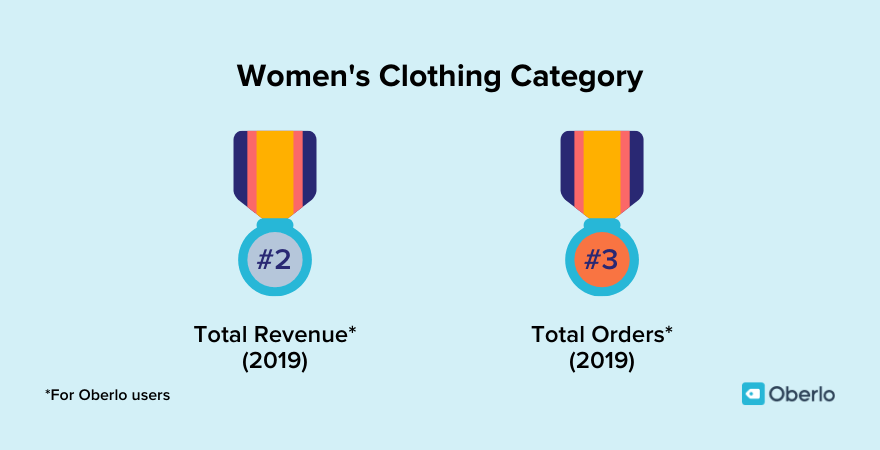
Jessica: Yeah, it’s funny, I was just watching another YouTuber say, “Women’s clothing is a dead niche ’cause women aren’t going outside so they’re not paying as much attention or maybe not investing money in what they’re wearing, don’t bother selling in it.”
And I just love it when a YouTuber says it because it means that thousands of people are going to listen to that which is just gonna clear a space for the creative entrepreneur to step into.
I disagree, I think women’s clothing will continue to grow and be a powerful niche. You just have to think a little bit more about how to market the product. Women aren’t going to be going out on the town for a date anymore, at least not in the near future as we’re seeing and so don’t sell those cocktail dresses, right?
At the same time, I can tell you, I made a purchase recently of a dress because I knew it had a nice pattern on top and I knew that would look good in all my webcam meetings and I thought I wanna do something to look a little bit presentable and formal in this new casual setting.
If I had seen an ad that spoke to that, we know you’re staying at home all day but it’s no reason to feel homely. I’d be like, “Oh my gosh, that’s exactly what I’m thinking.” That’s copy that would have sounded really weird three months ago. But now that copy is right on the money.
So a dropshipper can be creative and think about or ask their female friends if they wanna get into this dropshipping niche, “What are you looking for in clothing now?” And I think that’s gonna lead to some very different women’s clothing stores, but very profitable ones.
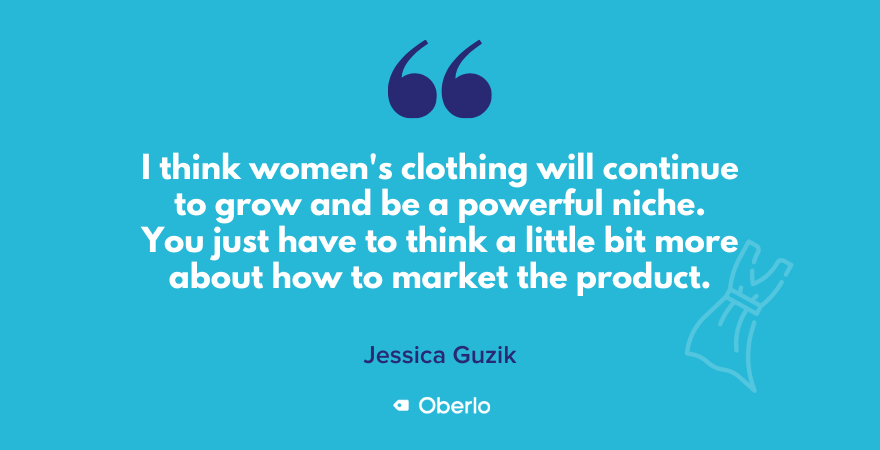
David: I didn’t know you were gonna be giving copy suggestions here. This is a bonus, beautiful.
Jessica: That was terrific, really.
2. Mobile Phone Accessories
David: Another thing that you were researching is this area of mobile accessories and we’ve talked with lots of store owners and dropshippers who’ve had… They’ve just crushed it with mobile accessories, smartphone accessories, phone cases.
We actually did a podcast just last week with this dude, Chris Wane who’s… His very first profitable product was this cat-themed phone case that… It was how he knew that this thing was viable and he went on to a bunch of big, bad sales, not just with the phone case but with all sorts of things. And so, this… Phone cases and phone accessories are something that our users and that ecommerce stores, in general, have done really well with.
But you’re saying there should be a little bit of a twist on mobile phone accessories. And so, what might be different between mobile phone accessories in this new economy that you were talking about versus what was successful in 2018 or 2019?
Jessica: Yeah, last year the mobile phone accessories that were seeing a lot of buys were the ones that made it easier to carry your phone outside, to protect your phone in different settings that you might be using it in.
The new wave of mobile accessories is the accessories that make it easier for you to use your phone from different angles in your house throughout the day.
And so, now, think about the fact that when you’re hanging out with friends now, you’re having to do it through your phone. You can either sit there with your phone to your ear or hold it in front of your face or more comfortably, find some way to put it in a stand so that hanging out with your friends doesn’t take so much actual muscle work from your arm.
There are a lot of different iterations of this. People are doing the same with not only mobile devices but iPads and looking for iPad holders and things like that. So that’s a space where you can get really creative.
How are people watching Netflix on their phones? Is there a way to attach a phone to a couch cushion?
I don’t know, but these are the things that I wish I had in my life and I’m probably not alone, whereas I’m paying zero attention to how to carry my phone outdoors that’s… In fact, I’m trying not to touch my phone screen when I’m outside. Maybe that’s paranoid. But I know I’m not alone, and I think that just speaks to… People aren’t taking their phones out of their pockets when they’re outside now.
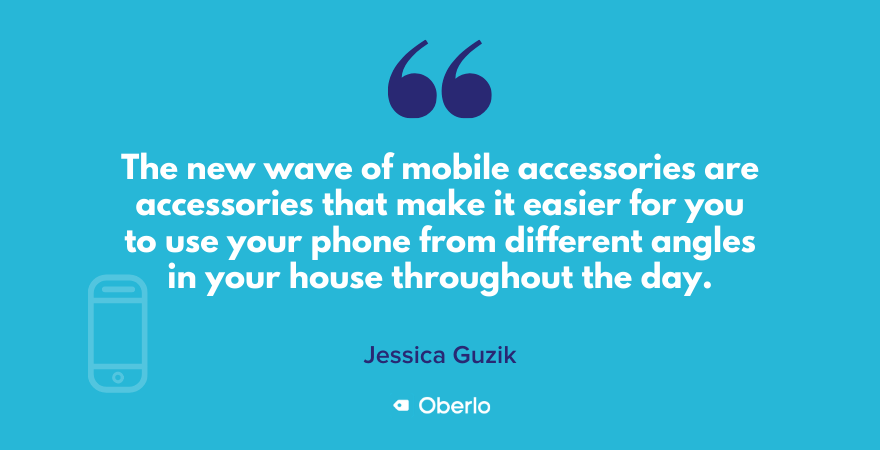
David: Yeah, I don’t think anything is too paranoid these days. My neighbor was wearing latex gloves yesterday and it was… I didn’t even think twice.
Jessica: Yeah.
David: I said, “Hey this is the era we’re living in.” So you can’t be too cautious.
3. Home Office Items
So next up, I wanna talk about home office items, and this is a category, Jessica, you and I are very familiar with. I’m currently standing at a standing desk that I got just recently to compensate for the fact that I don’t wanna sit for 10 hours a day at my kitchen table.
And then there are a million different home office things that people are doing now that they weren’t doing a few weeks ago just in terms of how to stay comfortable, how to get through a workday, which, as we’re all realizing, can be a little bit tricky when you don’t have an office to go to and you don’t have a coffee machine to go chat at.
So when it comes to home office ideas, people are getting real familiar with their homes, and they’re getting really familiar with the different headaches that come with working at home. What is it about home office items that you think is gonna set stores apart? And what should merchants be looking for when it comes to stuff for the old home office?
Jessica: Two words: laptop stand. If you actually go to Google Trends and you type “laptop stand”, for the past five years worldwide, you’ll see flat line, flat line, flat line, vertical line, just in the past couple of weeks.
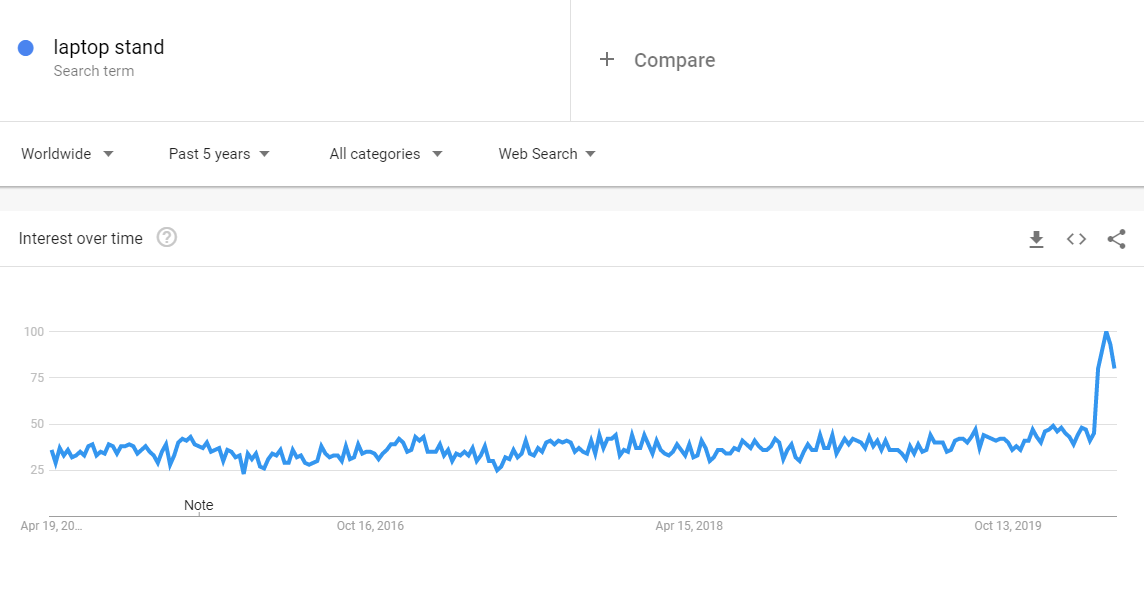
This is one of those small buys that can make a big difference. So, I’m actually tuning in from a laptop stand now, and it just lifts my laptop up off of my desk enough that I can look straight into it for meetings and I can record more comfortably. And so, I think, it’s interesting you mentioned your standing desk because we often tell dropshippers, “Don’t dropship furniture. It’s so big. The shipping is unwieldy.”
That’s still true, where something like a laptop stand, it’s like a smaller, lighter weight accessory to furniture that accomplishes the same goal as a standing desk or gets you 60 percent of the way there or so. There’s a ton of room to run here, too.
Laptop stands come in different angles, in different heights, some are laptop stands for desks, others are lap desks that you can put on your lap and then I can use my laptop on my couch.
But people are just looking for ways to be able to work productively on their computers from new awkward positions. So products that help people do that are going to be real big problem solvers and are going to get sales.
David: Yeah, I was literally using a box when we went to the work-from-home. I think people are getting desperate. And if you source products from AliExpress, they have all varieties of standing-desk contraptions. They have stuff that I’d never even seen before with joints that can angle different directions and you can adjust the height real easily. So there are a lot of products available out there that would solve the headaches and increasingly the backaches that we’re running into while we’re stuck at home.
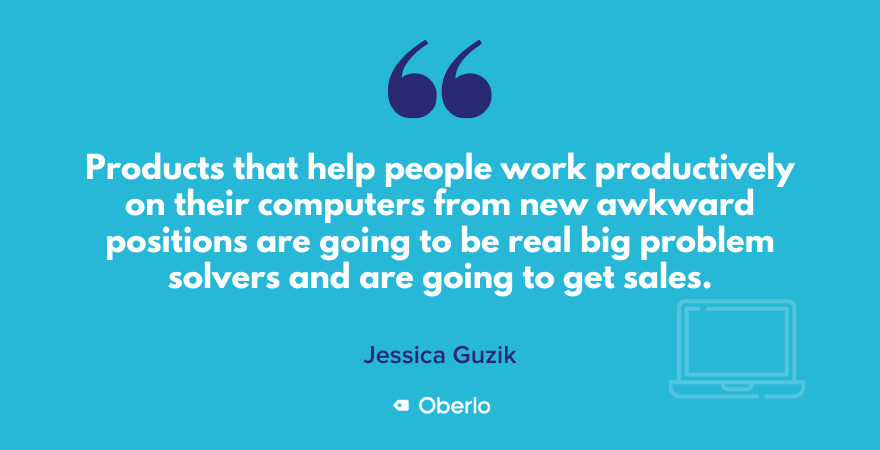
Jessica: Yeah, you said backaches and I just wanna make sure listeners know, when you’re talking about the problem that these products solve, they’re very physical. So, you should build your vocabulary for these product descriptions.
You’re talking about ergonomic desk stands, right? You’re talking about reduced cramps on the back and the neck, and you’re talking about carpal tunnel syndrome and you can avoid that with an ergonomic mouse and be careful not to make claims that your product heals something but these are the problems that will resonate with your target audience.
4. Jewelry
David: Yeah, you can abide by Facebook’s advertising policies and still make clear that there are legitimate physical advantages to this stuff for sure. Next one I wanted to hit on, I was surprised you had it on here, Jessica, and you can convince me now, it’s jewelry.
Common sense would be that this is not a time… If people are worried about money and if they’re stressed out and, I don’t know, things are just weird it doesn’t scream, “Now it’s the time to sell jewelry.” But there were some jewelry items that you thought would be very viable in kind of a down economy or in this weird time we’re in. So, what’s up with jewelry as we move forward through this list here?
Jessica: Yeah, this is the dark horse candidate and I’m gonna say this isn’t the laptop stand suggestion which is pretty watertight. But I think it’s a cool niche to explore and the reasons are gonna be different. So I recommended this domain name called, “Tiny Treats Jewelry” in the video and someone has since snapped that up. But I think that domain name paints the picture of what brand of jewelry will succeed in this economy.
A lot of people right now are talking about self-care. This is something that none of us have lived through before. It can be really rattling and I think it’s great that there’s a lot of discussion going on about how we can care for ourselves mentally and psychologically through this pandemic.
One thing that a lot of us are looking for is these little small indulgences so that we still feel like we’re getting dressed in the morning to go to work or we still feel special and presentable. We still feel like we’re doing something kind to ourselves when so much of what we’re doing with ourselves is limiting natural behavior.
So in that vein, I think the creative entrepreneur can look for jewelry that is affordable, that is small, that can maybe be worn on the ears or around the neck so that someone could see it on a social hangout or something, that someone can buy in the vein of treating themselves, of wanting to make their day just a little bit more special.
So when you’re selling this, the messaging that you’re going after is not like, “Dazzle your friends!” It’s very much about comforting yourself and that’s a really real reason that people buy jewelry.
David: Yeah, again, just to mention AliExpress, if you’re getting your products from there, they have a lot of cool stuff. I think that you might run into some duds there if you’re looking through jewelry but I’ve brought this up before in the podcast, we have an Oberlo colleague who got some wedding bling for her wedding last year from AliExpress.
So even those of us who are very familiar with AliExpress and any warts that might be hidden out there, we still do it too even with things like jewelry, so there’s definitely a lot of cool stuff that you can find there.
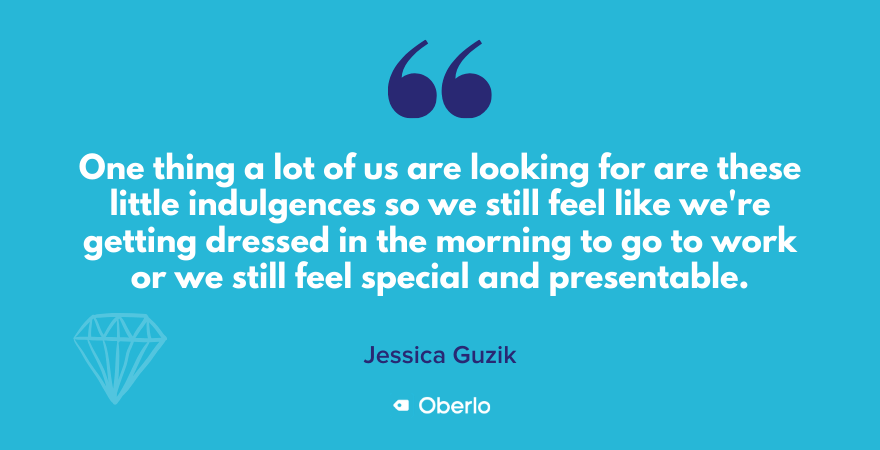
5. Home Storage Products
Alright, let me circle back for one more practical, maybe work-related item, and that is a desk organizer and you have this as a stand-alone item that doesn’t necessarily need to be just with the home office but can actually serve broader purposes than that. So what is it about a desk organizer and how should somebody be marketing this item?
Jessica: Okay, so maybe the desk organizer was a poor example. I was trying in the video to make a point about home storage and the reason I was doing that is it’s two-fold.
First, people are spending way more time at home and I don’t know about you but as I’m spending more time at home I am noticing all these little messes that in the past I would just be like, “Whatever, I’m going out to meet friends for a cocktail, out of sight, out of mind.”
Now that I see it all the time I’m like, “Oh, this mess is driving me crazy. I just wanna put it in a neat pile in a box and then I’ll feel better.” And so for that reason, people are looking for these home storage solutions to make their homes feel a little tidier.
But there’s another component to it. Consumer buying behavior is changing and people I think are, they’re buying in bulk when they can. I’m not saying that’s the right behavior, but it’s happening. Even if they’re not buying dozens of rolls of toilet paper. Maybe they are buying two more rolls than they would have.
Increasingly, that’s going to mean people have homes that are full of dry goods or freezer goods or toilet paper that they never had to really store before. So home storage solutions help them organize their home with its new inventory levels, so to speak.
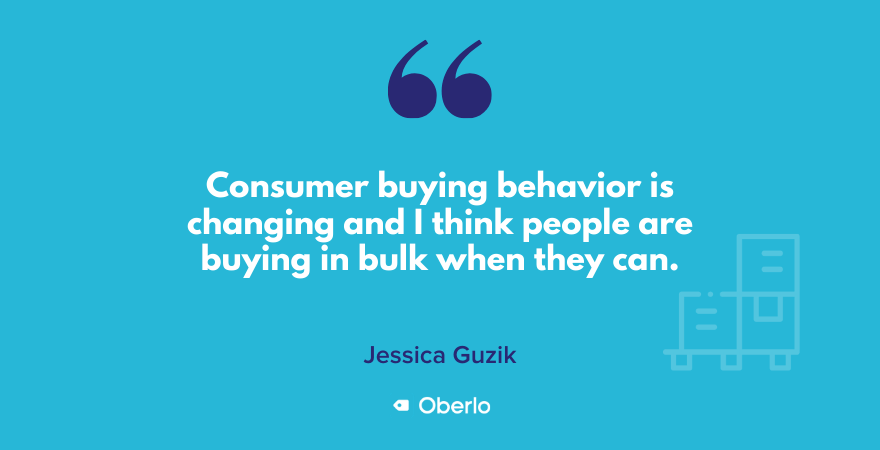
David: Well, you mentioned the freezer which is a beautiful segue into the kitchen, which is I know a place that you like to spend a lot of time cooking, whipping things up. I miss being in the office so that we can indulge in the baked goods that you are prone to bring in, so I’m looking forward to getting back to that. But let’s just talk about the kitchen.
I think people are going out to eat less. Even some of the restaurants in my area are reopening but I don’t really feel comfortable yet even eating at them as much. As I could go for a take-out pizza, it’s still… We were talking about being neurotic earlier, I’m still very much in… If you can’t spray hand sanitizer on it I don’t want anything to do with it right now.
So yeah, people are spending a lot of time in their kitchens, people are cooking a lot and this figures to go on for a while so what’s up with the kitchen, what should people be looking for both in terms of what’s cool and then also what’s practical for this new reality we’re dealing with?
6. Selected Kitchen Products
Jessica: Yeah, everything in the kitchen has potential right now.
But I think it’s important to point out what doesn’t have a lot of potential in the kitchen. So one thing is, anything having to do with hosting parties.
In the past, I’m a sucker for good glassware or interesting plates and maybe I would have wanted a really cool dinner plate set. I’m not buying that anymore. So that stuff is off the table. If you’ll forgive the pun, David.
The other thing to watch out for is just… I was saying this in the video, I, living in Germany, I have a hard time finding white flour. I do find it occasionally but this would not be the time when I would start making cakes just for fun.
So I know AliExpress has a lot of really great accessories for bakers and usually cake baking is such a passionate niche that I would say go for it, sell to cake bakers. Now I would say, don’t do that. Look for practical accessories in the kitchen that help people make the most of fresh produce, that help people organize what they’re buying and freeze it for later I should say. So things like that.
Also, look for accessories that help people keep their kitchens clean. So those are all kitchen accessories that will not only be popular buys right now but we know people will continue to buy kitchen accessories in the future. That has also been a pretty strong dropshipping niche even before the COVID-19 pandemic.
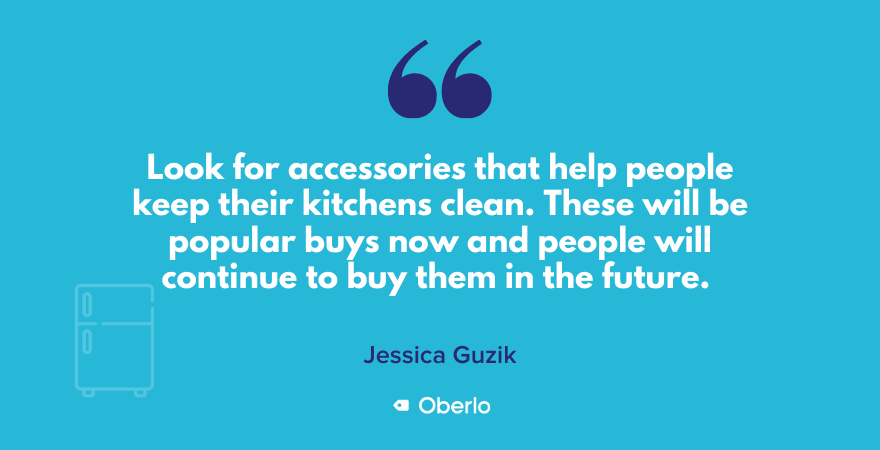
David: Sure, if you can ramp up sales on kitchen stuff now then there are all sorts of knock-on effects that’ll have even when things do return to normal in terms of your Facebook Pixel, for example, there’ll be… If you wanna get into… Invest in SEO… It’s not like kitchen stuff’s gonna go anywhere, as you said. So I think this is…
Like women’s clothing, this was a strong, strong category, heading into the pandemic, and it’ll be a strong one afterward and so you’re not gonna have to close up shop when things return to normal.
7. Plants and Gardening Products
Okay, another emerging category or theme that we’re seeing as people spend more time at home is gardening and plants, and this is something that I personally have invested in. I got some brand new baby cacti that I’m looking at every day just ’cause it’s… I don’t know, it reminds me of the outside, I get to pretend that things aren’t so bleak.
So I think people are thinking more about plants and gardening things. And so what are some house-bound items that people could be looking to sell when it comes to gardening?
Jessica: It’s funny, I am also getting into plants in a way that I never have before. So this is a niche that is really blooming.
David: Oh, number two.
Jessica: But this… I shouldn’t get any credit for this, actually, someone in a YouTube comment raised this as a really high potential niche and they’re absolutely right. Not only is this a seasonal niche that would start to get sales around this time anyway, but there’s even more of an incentive for people to take up gardening as a hobby to pass the time, as a way to grow their own food, as just a way to… Yeah, bring a little bit of the outdoors indoors, so there’s a lot of room to run.
If you look up the term, “seedlings”, on Google Trends, you’ll see it’s really spiking. That’s because right now is the time when people would plant seedlings, but it’s… The search is spiking to an extent that it hasn’t in any year before.
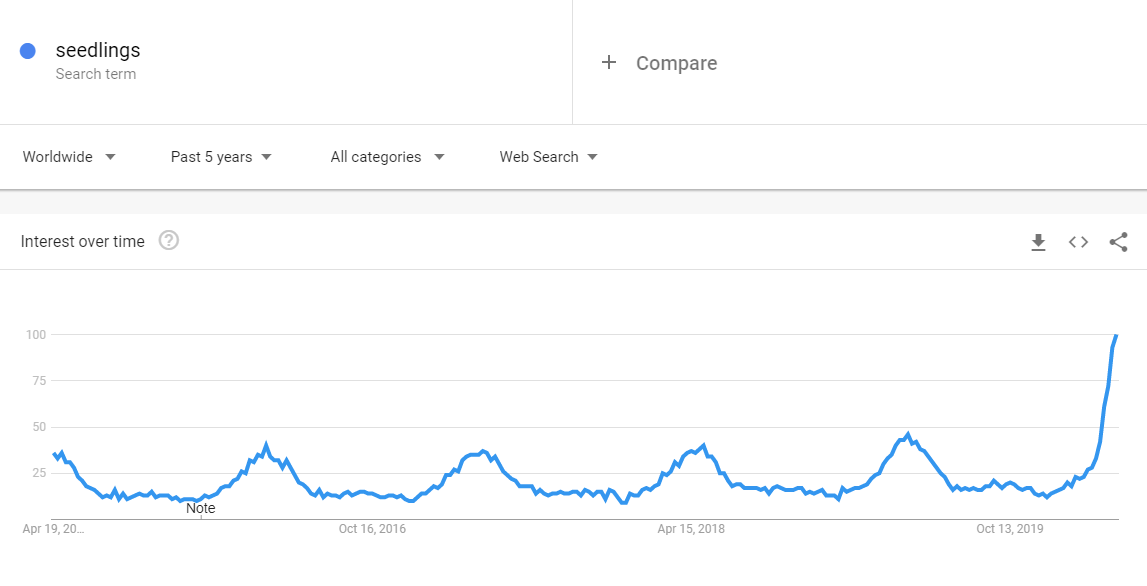
So one thing that a dropshipper could do is help people to start seedlings indoors with, for example, there are these little mats that keep soil warm so that you can do that more efficiently. But that’s really just the beginning.
There’s a lot of space surrounding this niche. Think novelty planters. Think watering cans. Anything someone could put in the ground to remind them what they planted or to remind them when to water it again.
And one big thing about this niche is it is ripe for content. So if you’re building an organic social media following right now because you don’t wanna spend money on Facebook ads, what you can be doing is choose a niche within gardening.
So for example, succulents like cactus are a great example and create a lot of tips. Help people plan their new gardens, “What can grow together? What would you put in a three-foot by three-foot lot? What about a five-foot by five-foot lot with a lot of sun?”
A lot of people are struggling with these variables because they’re gardeners for the first time.
I was doing all of this Googling, and that led me to some interesting plant stores because those plant stores gave me the answers to my questions, and then I bought from those plant stores.
So I’m just really excited about this niche personally, and I also think that a hardworking entrepreneur can capture this interest and even carry this interest and continue to get customers into the fall and winter when plant care still exists, it just changes a little bit.
David: Yeah, and this is one that has, I say, a pretty fervent fan base. We have a colleague who had a fake plant store, she found it not horribly difficult to build up a huge Instagram following just because people who are into plants are really into plants.
It’s something that… Yeah, people are passionate about it, and right now, whereas people are also passionate about cake baking, but now is not a good time to do it. I think people who are passionate about plants or whoever had even a mild interest in it, now’s a great time to get into gardening. And so it’s a good merger of circumstance and interest and definitely something that people could be checking out right now.
8. Home Exercise Equipment
Last one, Jessica, then I’ll let you get out of here, I wanted to talk about home exercise equipment or home gym items. I’ve definitely spent a lot of time yoga-ing and just stretching and planking and doing all sorts of stuff that I wouldn’t do if I could still go for the occasional jog. But we can’t always do that right now. So home gym stuff. What’s up with this category and what should people be looking for there?
Jessica: So again, in this category, you wanna look for things kind of like… Think of this category the same way we thought about the laptop stands. There’s a furniture option, which is big and bulky, and this is where Peloton is and other big exercise brands.
And then there’s a lightweight option, and dropshippers are gonna go with the lightweight stuff.
And here there’s so much potential to sell. Yoga mats, yoga blocks, yoga stretchy things, bands, I think they’re called?
David: Bands, yeah, yeah.
Jessica: Yoga bands. Also a lot of room to sell resistance bands, even some maybe lightweight weights of some sort. If you know anything about a particular sport, then chances are someone else who likes that sport is going to try to figure out how to train for it indoors. So sports products that help them do that, either through conditioning or skill-building are going to be really, really popular right now.
Then there’s the other side of things. It used to be that maybe a gym bag would be a really great thing to sell or something that kept your sneakers from smelling or a trendy water bottle. These things are not quite as attractive anymore. We’re not going to the gym, it’s just us and our stinky shoes at home, so who cares?
And I don’t need a trendy water bottle. I’m just using the same glass of water throughout my house all day these days. So this is a good reminder for dropshippers not to just look at a category and think, “Okay, everything in this home fitness category must be a best seller.”
It’ll still take some critical thinking to figure out which of these products is going to sell well right now.
David: Awesome, Jessica, we can leave it there. Thanks so much for taking the time to chat. You can find a lot more from Jessica over at the Oberlo YouTube channel where she’s dishing out tips of this variety every week, so be sure to check that out. And yeah, Jessica, thanks once again.
Jessica: Yeah, I’m never on the other side of the interview, this is a lot more fun. I appreciate it.
David: Alright, we’ll talk to you soon.
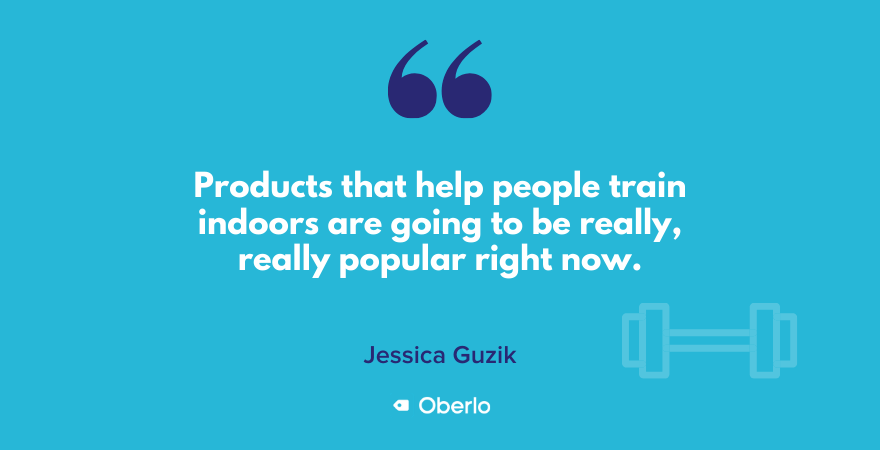
Part 2: How Gina Stepped Into the Sock Business
David: Now, lots of times when we talk about starting a business, we have a lot of different ideas about how you can find the best products to sell. So we might advise people, for example, to launch various ads with lots of different products to see which ones gain the most traction.
Or we’ve talked to other entrepreneurs who’ve created a bunch of social media accounts, and then they kind of work backward from those accounts to see which target audience is the most passionate, and then they’ll sell products targeted at them.
For you, though, it seems like it was socks or bust. You didn’t deliberate about what you were gonna sell. So tell me about your background with socks, and why when you decided to get into ecommerce. The idea of finding a product to sell, it was kind of already decided for you.
Gina: Yeah. So I decided that I wanted to get into the sock business because it’s a family tradition for me. I was born and raised in a small town called Fort Payne, Alabama and it has always been known as the sock capital of the world.
And in its heyday, one out of every eight pairs of socks manufactured globally came from our small town.
And my mom and dad, they’re sock makers. They’ve been sock makers since 1991 when they started our business from the ground up. So it’s just kind of in my blood, I guess.
Of course, when I was a kid, I was annoyed by it. “My parents make socks, how weird is that?” But I got older and more mature, and I started thinking and realizing, “Man, there is really something special about my mom and dad starting this business the way they did and working so hard to turn it into a success over the years.”
And I knew when I was in college, that was when I realized that I had to be a part of it in some way. But it was many years after college until I figured out exactly how I was going to be a part.
David: And so at the time that you got into socks, you were selling real estate, I believe. What was it about real estate that made you wanna get out of that and try something new?
Gina: Honestly… I was in real estate, I was only in real estate for a short amount of time, two years. I got into real estate, and as soon as I did, the market crashed. It was 2007-2008 when I got into real estate. But to be honest, that is not why I wanted to do something different. I knew, even before I was in real estate, that I wanted to kind of do something in the family business. I just didn’t know how to.
So when I was in real estate, I sort of began putting the dots together and realized I was not passionate about real estate at all. It wasn’t for me. But what I was passionate about was my family’s business, which had really begun to change over the past few years, at that time, because the industry, the manufacturing, was shifting overseas.
So their business that they had worked so hard over the years to turn into a success was now in danger. So things… I was scared for them and just really sad, just thinking that they may close.
That was definitely possible for them and almost happened. All the mills in town… We had 150, approximately 150 mills in our small town of around 17,000 people. The industry employed over half of the town’s population. And all of the mills in town were shutting down one by one by one.
Every day, it’s just… There is a handful that you would read about in the local paper that had closed because they could no longer compete with the cheap labor, company sourcing their sock manufacturing overseas. It was a bad time in the hosiery industry, I didn’t want my parents’ mill to close. And when I was in real estate, that was when it hit me how I could maybe get involved in their business by putting my spin on it, and it might help out the family business.
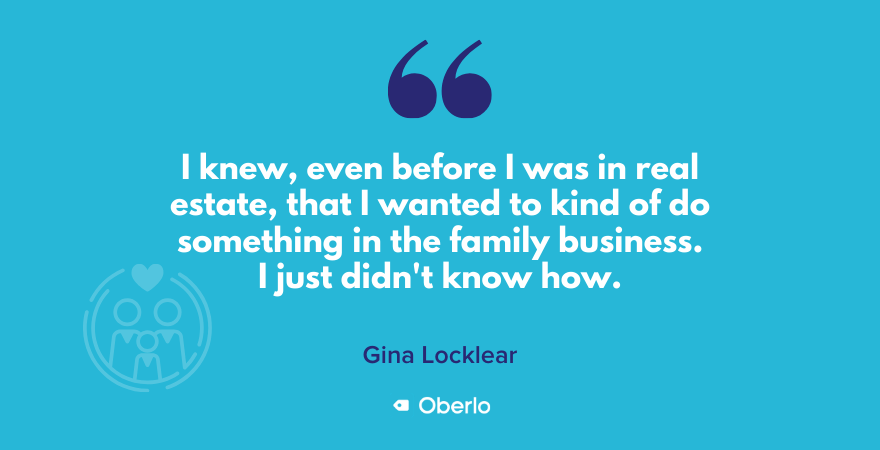
Going Into a Fashion Ecommerce Business Cold
David: It’s not as though you had a real, robust background in fashion or in ecommerce or anything. It’s interesting, on your website, you have a little bio of Zkano, and it says, “10 years ago, we introduced Zkano with a website with one stock photo of a cotton field and a single page of our small selection of socks.”
And so you’re very upfront about how you weren’t this ecommerce wizard who was stepping in to save the day. What was it about your approach to this that you think was able to shift things, given that it wasn’t the typical bio of somebody who was launching an ecommerce business?
Gina: I don’t know. And to your point, you are right, we did not know what we were doing when we launched Zkano, I will say that. And we just didn’t.
All we knew was that we wanted to keep making socks and our existing model for making socks was probably not gonna work anymore, so we had to rethink things.
And just to give you a little bit of a background, so for many years, when we started in ’91, and we still do some of this today, but traditionally, we were grey goods manufacturers, which is essentially just manufacturing unfinished goods. So we would make lots and lots of socks for large corporations, and knit the socks, throw them in a box, and ship them out the door.
There was no… We did not design socks, we made them to other companies’ specs. We did not do any kind of finishing or product packaging or anything like that, and we certainly didn’t have to worry about marketing the socks.
So when we launched Zkano, that turned into… Even though we knew lots of things about how to make socks, we didn’t know how to design socks with fun patterns. I knew nothing about colors. I had to learn everything about getting trademarks and packaging and marketing and selling to wholesale accounts and also selling online, and so it was a huge learning curve.
Like I said, I knew nothing and I learned every step of this process just by throwing things to the wall, so to speak, to see what stuck. And so, I just kind of had to feel my way out.
In those first couple of years, I learned so much every single day and it was such a learning process.
And we couldn’t hire an agency, a marketing agency to tell us what we needed to do. So we kind of were like, “Well, we make socks and we love making socks and… ” We think that a lot of people don’t understand that towns like Fort Payne are being hurt because of products that are being made overseas.
So that’s why we wanted to share our story. And our story of Fort Payne, Alabama in hopes that it might create awareness of that situation and that it might encourage people to support “Made in USA.” And so that was just… We were like, “Let’s just tell people our story.”
And so that’s just kind of how it all happened. And then after we decided we wanted to do that, I was like, “Okay. So we need a name for the company, we need a logo. I guess we need a trademark. Oh yeah, we need packaging.” It’s just that’s how it started. That’s how it came about.
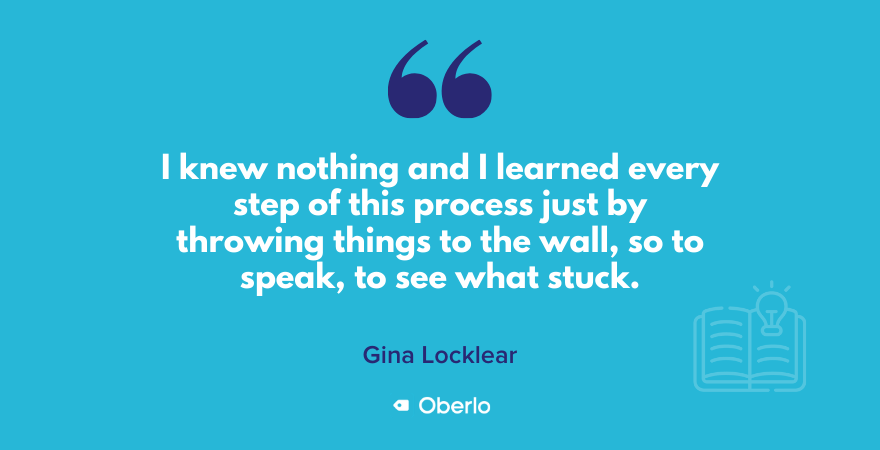
Emphasis on Sustainability
David: And so it sounds like you were working from the premise that the way that things had been going in Fort Payne, they weren’t gonna be sustainable, and so it wasn’t doubling down on what had been, but instead, kind of a pivot toward different things.
So you mentioned, colors, for example, and you also emphasized sustainability a lot and when it comes to how you source your cotton. Were these elements that you introduced that hadn’t been there before, was this an attempt to differentiate the past and the future from what you had been doing?
Gina: Yeah. So the sustainability, specifically the organic cotton, that was just… That came about because when I was in my mid-20s, I started eating organic food and buying organic groceries, and slowly incorporating sustainability into my life after that point, just a little bit at a time. So by the time I decided that I wanted to create a sock brand, that would be mine. I knew that I wanted to use organic cotton, low-impact dyes, and I wanted it to be sustainable in every way that it could be.
And that was very different from the type of socks that we had made for the previous 20 years. I remember talking to my dad, I still work with my parents every day, by the way.
But I remember first mentioning it to my dad that, “Yeah, I think we need to make organic cotton socks,” and he’s like, “What is that?”
So that’s kind of… After a few conversations, I finally got him on board. He’s like, “Yeah, I think that’s a good idea.” Because organics in textiles… Let me say, we were not the first people to make organic cotton socks. But in 2009 when we launched, it was a pretty new idea. So a lot of people knew why you would want organic food, but didn’t necessarily understand why it was important for cotton to be organic.
So we had… In the very early days, we had to do a lot… There was a lot of education needed about that, and we had to tell a lot… Had to answer the question a lot, “Why do I need organic cotton socks?” So that was really different from our existing business, and we had to find different sources for our materials than what we had always known, so that was challenging.
In addition to the cotton, we had to find ways to dye it that was sustainable too because I knew that I did not want to have this great organic cotton and then put conventional toxic dyes on it. That just didn’t work out in my head.
So we luckily found a supplier who was able to dye everything for us using low-impact dyes. And what that means is, is that the dyes essentially use less water than conventional dyes and they also are free of toxic chemicals and heavy metals. So it’s just things like that that were tough to rethink and to find suppliers for, initially.
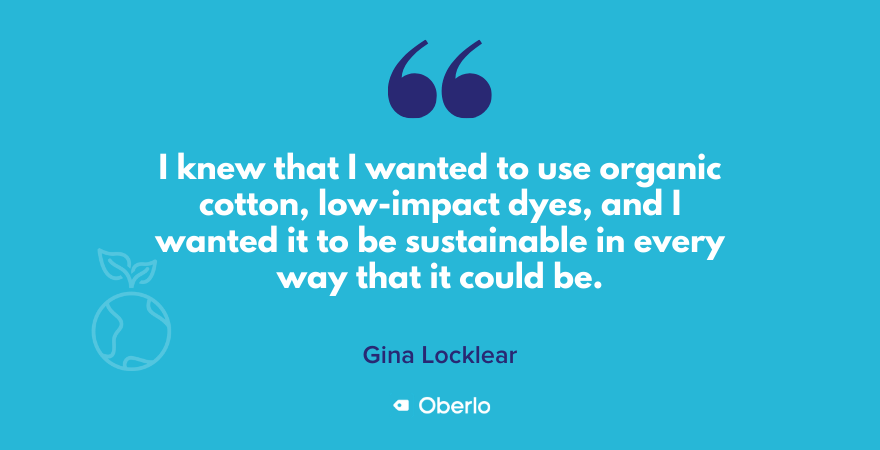
Weathering Your Store Through the Recession
David: It’s interesting that you had these complexities that you were introducing in terms of sourcing the cotton and finding the low-impact dyes. That was complicated enough, it would seem. But you also were launching Zkano into just a crazy economy.
And so you were launched in 2009 so it was after the initial crash of 2008, and then it was right in the heart of what would become a really sustained ugly period, all of 2009, and then deep into 2010. And we’re seeing headlines now as we record this in early April that are really reminiscent of the things that we were seeing back then.
So March 9th, last month, for example, there was a headline that said, “Dow sinks 2,000 points in its worst day since 2008.” And then just a couple of days ago on March 31st, “The S&P 500 lost 20% during the quarter, its worst since 2008.” And who knows what will happen between now and when we get this podcast published.
And so I’m curious, when you think back about that time that you were in that weird economy, not weird, that awful economy from 2009 and then what we’re seeing now, are you having any flashbacks? Is it jarring any memories from those times when things were also really, really dicey?
Gina: Yeah. Well, things are for sure dicey now. But when we started, or just thinking back to 2008, 2009, for us, we just put the business out there in such a grassroots kind of way, and we had a product… Back to the organic cotton, people were kind of weird about that honestly back then.
I think that a lot of people were sort of skeptical of organic cotton like people thought it was just a bunch of crap, to be honest with you.
That’s probably terrible to say, but and like I said, we’re not the first people to make organic cotton socks but it just took a lot of explaining.
So because we were so grassroots and just kinda putting it out there with our extremely limited resources and because we kinda had a new product idea, I’m not sure if ourselves were so slow in the beginning because of the economy or because of all of those things that I just mentioned. Today, I don’t know, that it was probably a little bit of both, honestly.
David: When you think back on that situation, and then your attitude heading into Zkano, did you have any sense that, “Boy, this really isn’t a good time to be launching a store right now.” Like, the economy’s falling apart and everybody’s either tight with money or they’re losing their jobs and everything’s just kind of upside down.
Or did you kind of not know any better? Like you were doing this completely unknown thing and whether the economy was good or not, you were gonna be kind of flying blind.
Gina: I was… Two things. I was definitely naive about the economy. I was young, I was in my 20s. I was just so naive. But also, here’s the thing. We had no choice. If we were going to keep making socks, we had to try something new then or it wasn’t going to happen.
I’d kind of brushed off what was going on with the economy. I was like, “This is what we’re gonna do.”
And maybe I kind of ignored it a little bit, but we really, really, really, really wanted to keep making socks, so it was then or never. I don’t think that if we had waited on the economy to get better in a few years, I can say with certainty that Zkano would not have happened.
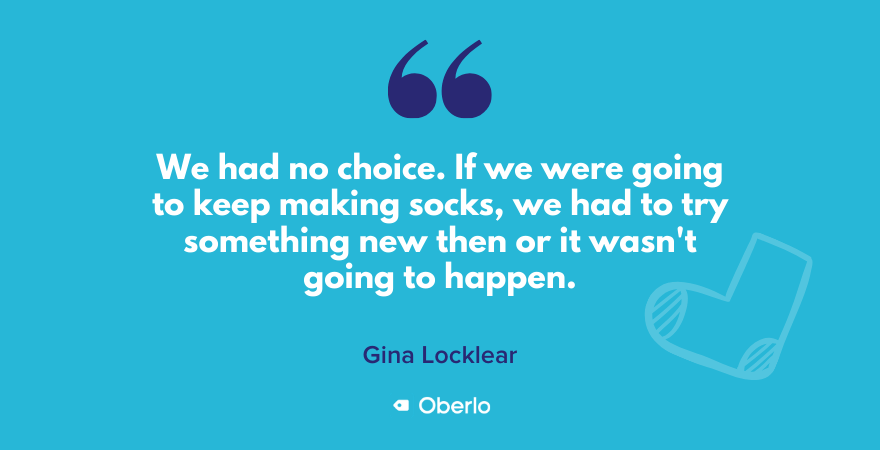
Potential Businesses to Launch Now
David: Now I wanted to ask if there was any advantage to launching a business in a time like this, and I should qualify this. People can use our software to launch ecommerce stores. So, it’s fair if somebody thinks this is a loaded question because, of course, we want people to be starting businesses.
But you and I didn’t rehearse anything here so there’s no pressure if you wanna answer this one way or the other, but if you think this is a bad time, feel free to say so.
But the reason I ask is that maybe there are quirks in the market or quirks with an economy like this one, that people could take advantage of, so there might not be as many other stores launching or maybe advertising costs are a little bit down.
So in an economy like this, are there truths that people could kind of cling to to give them a little bit of comfort and say, “Hey, I can start a business right now and that it’s actually reasonable to do so, because of X, Y, and Z.”
Gina: Well, I think because of tech, launching a business is so much easier now in these times, so that’s a huge benefit and social media as well, and I think that some businesses are… I would say the answer is no, but then I think if you have a business where you can offer a service that kind of fits the needs of where everyone is in these times, I think it could go quite well for you. I think it just depends on what kind of business you have.
David: What kind of business should people be launching now?
Gina: Any type of service that maybe helps us live our lives at home in a better way, in a socially-distanced way. I see a lot of small businesses here, small businesses that I shop with a lot and I’ve been impressed by… They’re not new, but they’re kind of newer businesses, and I’ve been impressed how they’ve quickly restructured and changed their services to meet the needs of where we all are here in these incredibly strange times.
So I think that if you can streamline a service for somebody and like I said, to make it easier for us the way that we’re having to live our lives right now, I think that that would be good. I think that that could be a success.
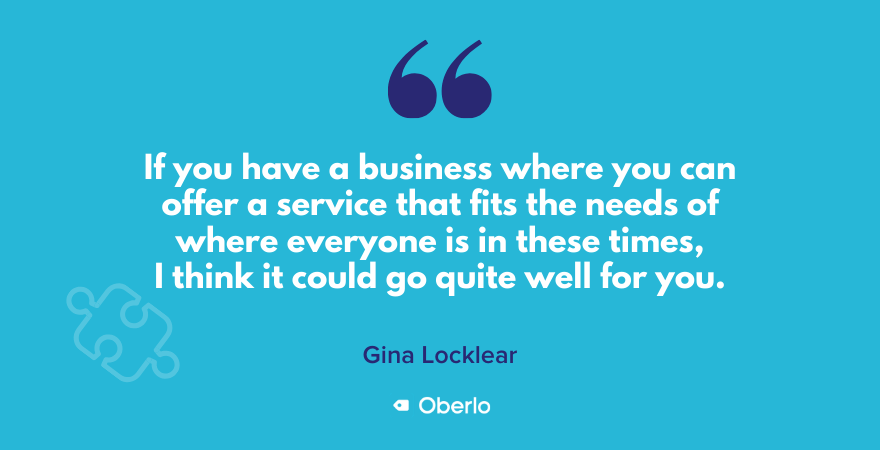
David: Yeah, for sure. Are you anymore… I don’t know, relaxed about what’s to come, given what your business has already been through back in the early days. Does it give you any extra peace of mind, to know that you already conquered one of these messes, and that you could do it again?
Gina: I do think that… I think that we’re gonna be okay. I think it’s gonna be a very rough year for us, honestly. Of course, it’s gonna be a really rough year for every single business. But yes, we launched this business in a storm. Certainly not this type of storm but a different kinda storm.
The sock industry was leaving the US when we launched Zkano and then, like you mentioned, it was in a terrible time for the economy. So I think that we can pull through and just being 10 years old, I feel like we’re pretty established at this point and we can…
We have the resources to weather it a bit to a point where it wouldn’t have been that way five years ago.
Business Plans Getting Thrown Into Disarray
David: So what has the current situation, which is, of course, evolving daily, it’s insane how much things change in just a matter of 12 hours. How has this kind of affected your plans? ‘Cause I could imagine that in Q4 of 2019, you cooked up a 2020 road map and I would imagine there was no pandemic plan on there, and so what has this done to what you had wanted to do or what you had planned to do and how are you kind of adapting to live in this like really day-by-day situation that we’re in?
Gina: Well, how I’m living in it, I just, I do not know what’s going to happen later this year, I’m just taking it each day at a time. But I can say our business has been really affected so far.
We lost over half of our wholesale business for the spring and summer, which is something that we at our mill depend on very much during the first half of the year because our website business doesn’t really get going until like summer.
So we really depend on those little shops that we work with to place those spring and summer orders and we lost most of them. And then that affects us because now we’re having a hard time finding work for our employees to do and we’re not going to lay anyone off.
So it’s just… That’s how it’s hurt us so far. But then what’s really encouraging is that we sent out an email last week, and I just… I wrote it myself, it was just really from the heart and very honest, and I let people know that like many other small businesses, that we have been hurt too. And just kind of ask for people’s support and our customers really answered that call, and I have to say that was our most successful email that we’ve ever sent out to date.
And so, I think that the silver lining is that people really do wanna support small businesses right now and they are shopping online right now. For me, it’s just how do I continue to get people… To get our customers to continue shopping with us each month, you know? And not forget that we’re here and, “Hey, we still need your support.”
So I’m trying to figure out that. Just dealing with the fact that I think that our state will force us to close in the coming weeks if not sooner than that. So just trying to, like I said, take it one day at a time. But we’re gonna weather this storm.
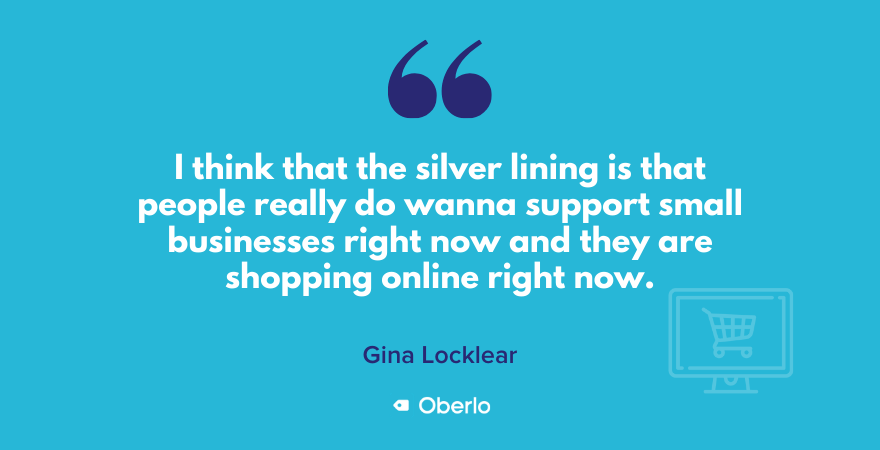
Stress Management and Avoiding Layoffs
David: So your business was featured in a New York Times article, and in there, there was this line about how you had all these responsibilities and that it was something that kept you up at night. And this was a few years ago, which would have theoretically been in kind of a good time or at least kind of a placid economy compared to what we’re doing now.
And so I’m curious how you personally are dealing with these stresses that come with this, ’cause I think running a business is a stressful endeavor. And then running a business with all this other societal and economic stuff on top of it, it’s gotta be pretty daunting. So I’m curious what that’s like from your soul or your spirit, how are you holding up, given that there’s plenty to worry about during the good times?
Gina: True. I stay awake a lot of nights worrying about different types of things and different challenges that we struggle with on a good day. For the past two weeks, two weeks, I feel like I have been fairly calm about what was all going down until, I don’t know, a couple of days ago when I realized that all of our suppliers are shutting down, which affects our fall yarn orders, which will now be delayed, and when our fall yarn orders are delayed, our fall production is delayed, and our fall shipments are delayed.
So our whole fall line is just delayed, delayed. When I realized and started thinking about that, honestly I just felt like I was having a panic attack.
I don’t know, that was I think when it just really hit for me and I’ve also been like, “Okay, this is spring. This is spring and summer. Our spring and summer season is shot, and that’s fine. We can deal with it.”
But now they’re saying that it’s going to possibly come back during the fall. And that’s horrifying because the fall and holiday season is when we make probably 80 percent of our revenue for the entire year.
I’m just kind of thinking of those new developments and it’s nerve-racking. And the biggest fear is just keeping people employed, honestly. We employ less than 10 people here at our mill. We’re very small, and our employees truly are like family to us. Yeah, I worry about that and I don’t know…
Everyone who works for us loves their jobs, and that to me is so valuable because I know what it’s like to work in a job that you don’t love. Been there, done that. It’s miserable. The fact that our employees love doing what they do means so much to me. And so we just got to keep…
We’ve gotta keep everyone employed.
I don’t know, those are just some things that are going through my head. If we have a relatively normal fall season, we will be totally fine. It’s just… Who knows what’s going to happen? No one.
Stubbornness Prevails
David: I think that’s my overarching takeaway is that nobody knows what’s going on ’cause like I said, things are just changing so quickly, it’s really hard to keep track of. So Gina, one more question for you then I’ll let you go.
I’m just curious what you would tell anybody who’s just started a store, or who’s thinking about starting an online store, and if they’re kind of in white-knuckle time now as they look around at the circumstances. You’ve overcome a lot with the manufacturing getting outsourced to different countries. That’s hard enough to deal with, but then you also overcame the great recession and the financial crisis.
You’ve kind of been through some wars and so I’m curious. With your battle scars, what would you tell somebody who is getting a little bit queasy about this environment that we seem to be going into now?
Gina: Be stubborn. That’s how I’ve always been, I’ve been so stubborn that I would… That’s why I never quit in the really hard times, honestly. You’ve gotta persevere. Us small business owners truly love our business and we love our products. So, passion for what you do kinda comes naturally. Just don’t give up and just be stubborn.
David: “Be stubborn” is a good place to leave it. Gina, thank you so much for taking the time. Again zkano.com, that’s Z-K-A-N-O dot com, and beautiful website, beautiful products. Gina thanks once again so much for taking the time.
Gina: Thank you very much for having me. I appreciate it.
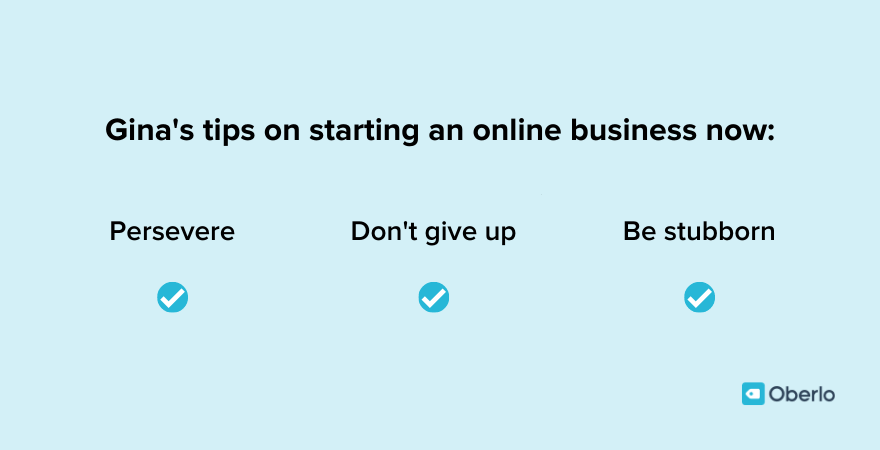
David: A huge thank you once again to our awesome guest today. You can find much more from Jessica. As we said, over at the Oberlo YouTube channel. You can find much more from Gina over at zkano.com. So be sure to check out both of those spots for various kinds of goodies.
If you want more from Oberlo, we’re over at oberlo.com. We have lots of stuff going on on the blog right now about COVID-19, about this weird situation that lots of Oberlo users, lots of ecommerce entrepreneurs are finding themselves in. So check it out there, lots more on YouTube, of course, more episodes of the podcast wherever you listen to your podcast. You can find us on social: Instagram, Facebook, Twitter, and so on. And yeah, we will talk to you soon.
Want to Learn More?